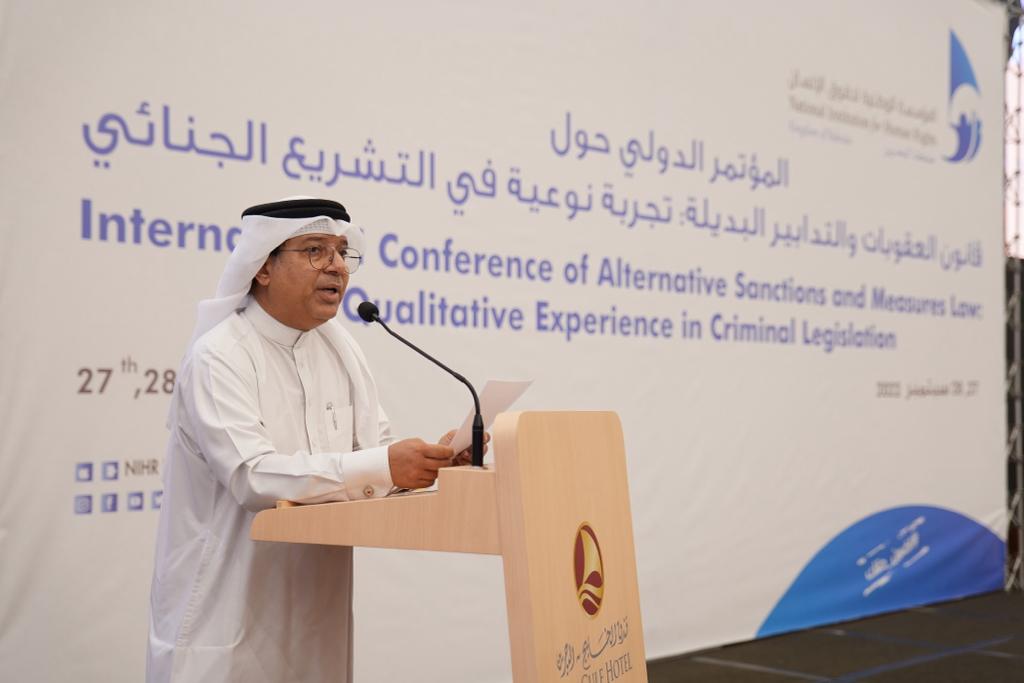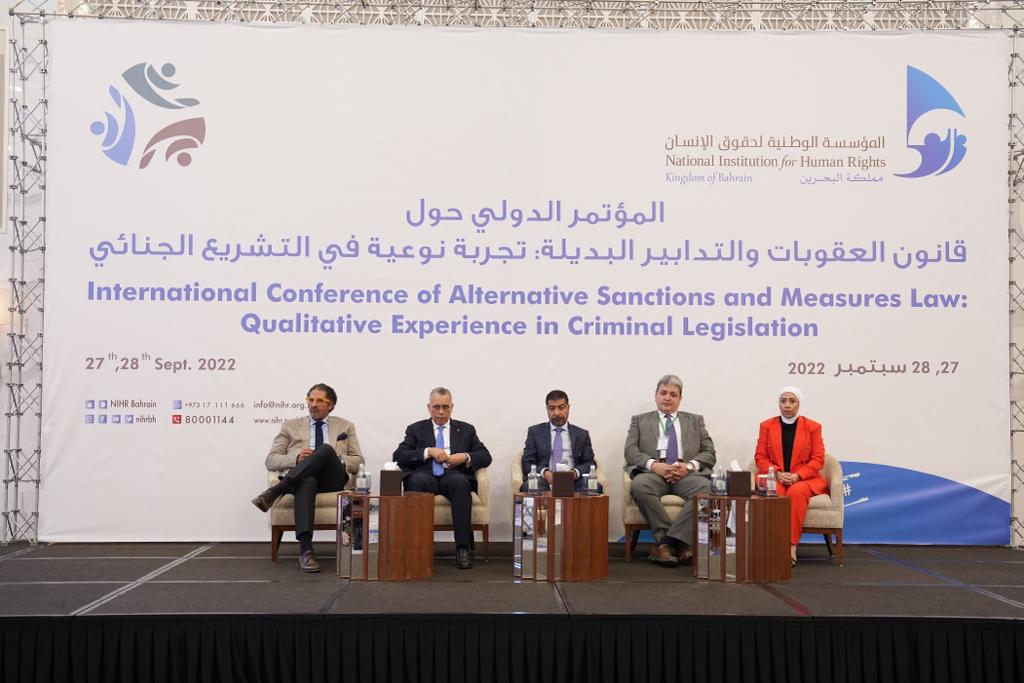Conclusion of the International Conference on “The Law on Alternative Sanctions and Measures: A Qualitative Experience in Criminal Legislation”

Today, Wednesday, the work of the International Conference organised by the National Institution for Human Rights (NIHR) in the Kingdom of Bahrain, under the theme "the Law on Alternative Sanctions and Measures: A Qualitative Experience in Criminal Legislation", concluded with wide local, regional and international participation in the field of human rights.
The international conference called on national human rights institutions, NGOs, civil society institutions, human rights defenders and specialists to move forward to find a law in countries that have not enacted a law on alternative sanctions and measures, and recommended that the national legislation regulating alternative sanctions and measures should be compatible with the UN standards for human rights and criminal justice and other relevant international decisions, including the permissibility of ending the alternative sanction before the expiry of the prescribed period for it, and considering this as an exemption for the beneficiary from the remainder of his sentence when to the judicial authorities that the concerned person is entitled to it, in accordance with legally defined guarantees, controls and procedures.
The final statement of the conference, delivered by D. Malallah Al-Hammadi, member of the NIHR Council of Commissioners and Head of the NIHR’s Committee on Visiting Detention Places and Facilities, stated the need to complete the legislative structure of the law and the open prisons in accordance with the modern codes in this regard, as one of the legal means
that has a significant impact on reforming the convict, assessing his behaviour and making him eligible for reintegration into the society, while adopting the Laws on Alternative Sanctions and Measures and the Open Prisons within the plans, strategies and national action programmes for human rights, taking into account to grant the beneficiary a certificate proving his good conduct and behaviour to enable him to complete his academic (university, professional or school) studies, without prejudice to the application of the alternative sanctions in his right to continue such study.
The conference stated the need to take advantage of the recommendations generated by the theses and scientific research on alternative sanctions and measures, to be a beacon to guide the development of the reformative justice system, with an emphasis on building the capacities of workers in the field of alternative sanctions and measures and the open prisons, including members of the law enforcement agencies, and establishing specialised units within their administrative structure entrusted with supervising training, raising awareness and proposing development recommendations in this field.
The participants stated the importance of raising awareness within the correction and rehabilitation institutions among the inmates of the legal conditions and controls established for the possibility of their inclusion in alternative sanctions and measures and the open prisons, and facilitating the prescribed procedures upon their personal request within those institutions to replace the penalty, while inviting national human rights institutions to support the relationship between NGOs and human rights defenders on the one hand, and the official bodies and agencies on the other hand, with regard to the development of the reformative justice system, especially regarding alternative sanctions and measures, with more attention and awareness-raising among official bodies, companies, private (civil) institutions, NGOs and human rights defenders of the feasibility of the Laws on Alternative Sanctions and Measures and the Open Prisons, so that all of them become real partners in the rehabilitation and correction of the beneficiaries of alternative sanction, through the provision of a number of rehabilitation works and programmes to encourage social integration in light of the provisions of the Law on Alternative Sanctions and Measures.
The conference called for a legislative amendment that the convict who benefits from the alternative sanction can pay the fine imposed in conjunction with the implementation of the alternative sanction in installment, and that the payment of the convict’s entire financial obligations shall not be a precondition for the application of the alternative sanction.
The conference aimed to converge views and conduct an integrative dialogue between the authorities responsible for implementing and applying the Law on Alternative Sanctions and Measures, by highlighting the role of each of the relevant authorities, through understanding the challenges facing those authorities in implementing the law, benefiting from the experiences of other countries and reviewing the role of national human rights institutions, NGOs and stakeholders in this regard.
The conference also discussed the efforts made by ministries and official bodies on the implementation and application of the Law on Alternative Sanctions and Measures,
presenting the realised achievements, and investigating the role of national human rights institutions and Arab and foreign NGOs and the experiences of countries on this law, the challenges facing the authorities supervising the implementation and application of the Law on Alternative Sanctions and Measures, and the practical problems facing the beneficiaries from the provisions of the law.
The speakers and participants in the conference commended the Kingdom of Bahrain’s pioneering and qualitative experience in applying the Law on Alternative Sanctions and Measures, being the broadest, most comprehensive and most developed law in the region, and thanked the NIHR for the hosting, warm reception and generous hospitality and for facilitating the work of this conference in the Kingdom of Bahrain.


